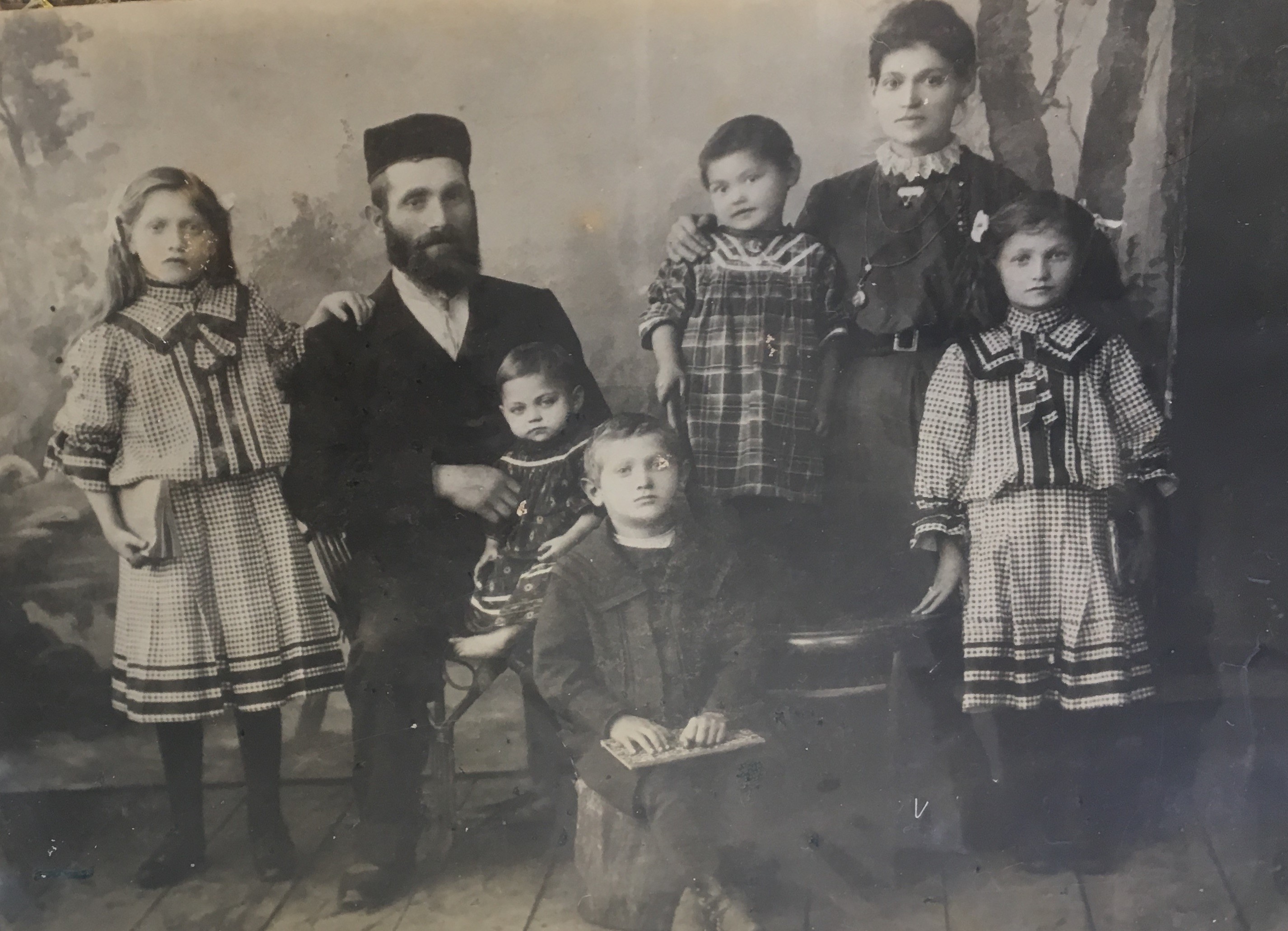
Label Fuchs Family, Label, wife Its Riva,
children L. Shula, Sam, Sonia, Freda.
Seduva,
Lithuania
1913
|
|
Label Fuchs.
(1870-1930) Label chose to stay in Shadeva. He was a flax merchant and
the town Hazzen. He and his wife, Ita Riva Berkow, had 7 daughters and
one son. His former home can be seen on the Shadeva website. He had a
beautiful voice, bright red hair, and loved to sing. Family members
remember him as emotional and excitable.
He was supposedly very unhappy with his wife for encouraging
their children to emigrate. The story is that he went to the steam bath
in 1930 to prepare for the high holidays and died.
His Lithuanian death certificate lists his age as 60 and states
that he is buried in the local Jewish Cemetery.
Following his death, his wife Ita
went to the RSA to join family who emigrated earlier.
Saul Fuchs paid for her relocation. All of Label and Ita's seven
daughters and one son went either to the
US, RSA or
Palestine. Ita
had at least 2 brothers with large families who stayed in Shadeva. They
all perished in the Shoah.
Meyer Janet additional
information:
Leibe Meir Fuchs (also known as Leibe Roche) was my grandfather.
He was born and raised (as
was my grandmother) in Seduva. He had black hair but a red beard. He
was a Flax Merchant which entailed some travel out of town. He was
musical and played the Mandolin. He was somewhat of a Chazzan or perhaps
more of a Bal Tefillah, serving the Stibel Shul Community of the town.
The family lived in Keidane Gas
(the street that led to the town of
Keidan).They shared a back yard and a goat with
the Grasko family. As the story is told, on one Seder night, when the
door was opened for Elijah Ha Novi, the children led the goat into the
room instead. The reaction to this prank can only be imagined.
Label
Meir was a very
emotional person and disturbed that
his children had been encouraged to leave home. He challenged
Ita Riva, saying she
“chasing all of the fledglings
out of the nest”. Thankfully she prevailed.
He passed away on Succoth 1930. He had gone to the Mikveh to
prepare for the Yom Tov where he suffered a stroke. He was brought home
and died on Yom Tov. Therefore he could not be buried for two days and
his body remained in the house over that period.
Label's widow, Ita
Rive left Shadeva sometime after the death of
her husband. She most probably moved when the youngest daughter
Pesai (Peske) left for Palestine
(1935). Once in the RSA, she
moved in with her daughter Freda
although she did visit
her other children. She, as other women of her generation, did not have
a formal education. She spoke Yiddish and understood little Hebrew or
English. She prayed out of a Yiddish siddur.
Ita Rive was fond of animals and used to feed the cats in the back yard of
Freda’s house. I recall her having a bad stoop and deformity of the neck
vertebrae. She died after a fall in 1956. (Source Meyer Janet)

Label Fuchs Family Left top: Bilha,
Pesia, Sonia, Left bottom: Tziporah, Mother Ita, Father Label and
Hadassah - Seduva Lithuania
late
1920s
|
|
Yudit
Natkin/ Gertie Lipman additional information:
At the
beginning of WWI, the Russian Government destroyed the town and exiled
Seduva's Jewish inhabitants to the Ukraine.
This caused immediate mass chaos. Our
family ran to the railway station where there were thousands of people
and very few trains. We were 9 children, the youngest only a few months
old. Eta
Riva put the baby in a cardboard box and asked a lady to hold the baby
until she returned with all the other children.
When she we
nt
looking for the lady and asked for the box only to be told that she had
put it with other luggage in the luggage department!
It took the family over half an hour
to finally find the baby, safe and well in the box!
In the Ukraine
they stayed with a big woman who sat on a rocking chair in front of her
house cursing all the Jews, while inside she hid all the family! The
situation was so bad that the baby Pinchas died of starvation at the age
of 2.
Eta Riva became hunch-backed from the
lack of food and was never physically the same, previously she had been
tall and straight.
The Fuchs tried to live a normal life in the
Ukraine
but the economic and political situation was very difficult due to the
revolution and civil war. Only Samuel aged 11 found work in a bakery. He
earned a loaf of bread a day which helped fed the entire family. He held
a second job in construction as a general laborer.
The family lived on his earnings from
both of his jobs.
The Fuchs returned to Sedowa in Lithuania
after the war in approximately 1918 and survived on funds sent from
South Africa
by Uncle Saul.
Sam obtained work in a bakery so that
at least the family had bread to eat.
The elder girls were sent to a Russian
school.
Though they had next to nothing, they
were always neat and clean.
(Source Yudit Natkin)
|

